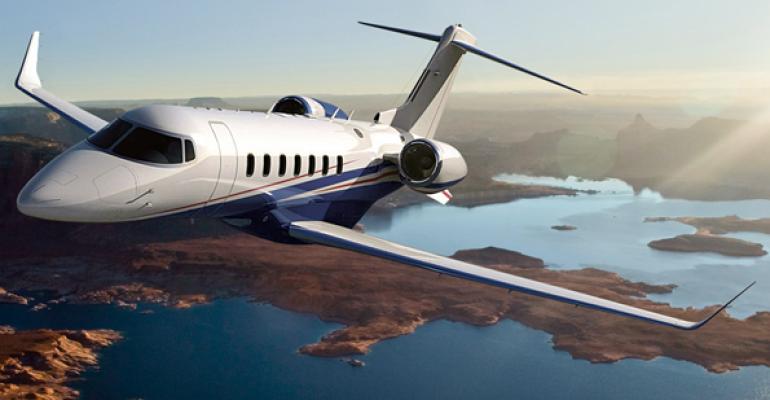(Bloomberg) -- For more and more deep-pocketed people who don’t want to fly commercial, owning part of a private jet is better than owning the whole thing.
Wealthy travelers who tried charter flights during the pandemic have upgraded to be able to book a flight in as little as four hours, according to Richard Koe, managing director of WingX, an industry analysis firm. And business travelers increasingly want anonymous flights, he said, to avoid revealing potential deals to sleuths who track corporate jet movements.
“Some people moved up into fractional programs, some people moved down,” Koe said. “The result is you’ve got these operators doing better than ever.”
Kenn Ricci owns several private-jet companies through a holding company, including fractional operator Flexjet, jet-card company Sentient Jet and charter company FXAir. Flexjet by far has attracted the most demand, he said.
“We still have a backlog of customers in the next year,” Ricci said of Flexjet. “That’s something that we just never have had.”
Fractional operators – dominated by Berkshire Hathaway Inc.’s NetJets and Flexjet — saw a 5.2% increase of flights in the first nine months of this year even as charter aircraft flights fell 6.4%, according to WingX. In the past four years, the growth of fractional flights has also outpaced those by charters and corporate-owned aircraft.
Private flights boomed during the pandemic, when skipping airport security and departing from a separate terminal far from the coach-flying crowds suddenly had a greater appeal to America’s ever-growing class of multimillionaires.
Fractional jet ownership, a model dating to the mid-1980s in which people buy as little as a 16th of a plane in exchange for flying time, emerged as the winner in the race to provide private travel.
While fractional ownership can be more expensive than on-demand charters or prepaying for flight hours through a jet card, customers always travel on the same type of aircraft and can do so with little advance notice.
Fractionals handle all the operations of owning a jet, such as pilots, maintenance, insurance, fuel and hangar space. Those costs for direct ownership can range from $700,000 to $4 million depending on the size of the aircraft and how much it’s flown, according to Vault Aviation.
In comparison, the fractional costs for a Challenger 3500, a mid-size aircraft, are about $1.7 million for a 16th ownership that comes with 50 hours of flying a year. The fee is $20,000 a month and the per-hour cost to fly is $6,000, according to Nick Copley, president of SherpaReport.com, which provides comparisons on private aviation services.
Growing Demand
As travelers flocked to fractional operators during the pandemic, many, like Airshare, based in Overland Park, Kansas, had to stop taking on new customers in 2021 because of the demand.
“Though it’s leveled off, it’s still much higher than it was pre Covid,” said John Owen, chief executive officer of Airshare. Now his firm is taking on new customers and just purchased the aircraft management business of Wheels Up Inc., which gives the company a nationwide presence from which to build out its fractional operations, he said.
Flexjet’s sales are expected to grow 6% in 2024 to $3.6 billion, twice its sales in 2019, Ricci said. Berkshire Hathaway reports NetJets results as part of its service group; that unit’s revenue in the second quarter was 150% greater than in the same period in 2019, according to Seth Seifman, an analyst with JPMorgan Securities LLC.
To keep up with demand and to replace older aircraft, NetJets announced in September options to purchase 1,500 aircraft over 15 years from Textron Inc.’s Cessna unit following a May deal to buy as many as 250 Embraer Praetor 500s, a mid-sized private plane.
NetJets said that many of its fractional aircraft are sold out until January 2025 and the company is taking deposits from customers who want to fly on its fleet right away while waiting to purchase a portion of a new aircraft.
“NetJets continues to take strategic steps to meet heightened demand including the increased investment in new aircraft,” the company said in an emailed statement.
Flexjet is in negotiations to buy more aircraft. A deal wasn’t reached in time for the National Business Aviation Association’s annual conference that began Oct. 17, but “something will be forthcoming soon,” Ricci said. Canadian manufacturer Bombardier Inc. “is a likely candidate” for a Flexjet order, Seifman said.
New users of private aviation will drive up demand by about an additional 500 aircraft over the next decade to 8,500, according to an annual survey of business-jet operators by Honeywell International Inc., a large aerospace supplier. The survey doesn’t include fractional operators.
Fractional operators’ fleets have increased by 30% since the beginning of 2020 with new plane purchases, according to Cirium, which provides industry data. The larger fleets for charter aircraft, which are individually owned planes that are also rented out to offset the ownership expense, rose less than 8% in the same period.
Exclusive Clubs
For the manufacturers, steady fractional aircraft orders offer more predictability to production schedules, but have downsides, said Brian Foley, a private jet industry consultant. Because of the large plane orders, fractionals command discounts and some deals require planemakers to take older models as trade-ins.
“Having a bunch of airplane orders sounds exciting, but there are strings attached,” Foley said. The manufacturers can be “saddled with trying to ditch a bunch of worn-out planes.”
During the pandemic, NetJets and Flexjet also had to pause taking on new customers as planemakers struggled with supply chain issues to provide more new aircraft. That made the fractionals even more popular with private-jet travelers, Ricci said.
“It’s like trying to get into a country club and they tell you, ‘Sorry, we have a waiting list,’” he said. “Well, that’s the club you want to get into.”





